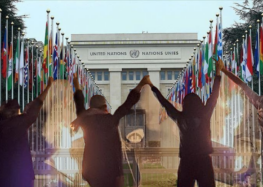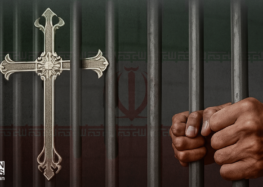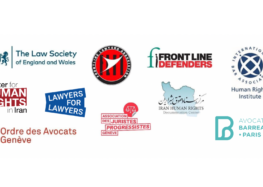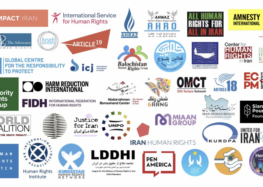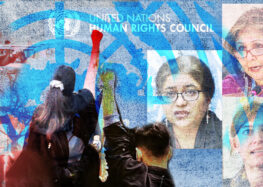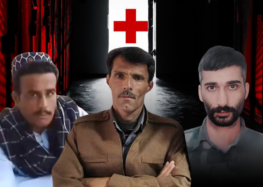Iranian Civil Society Asks Obama to Remove Crippling Sanctions
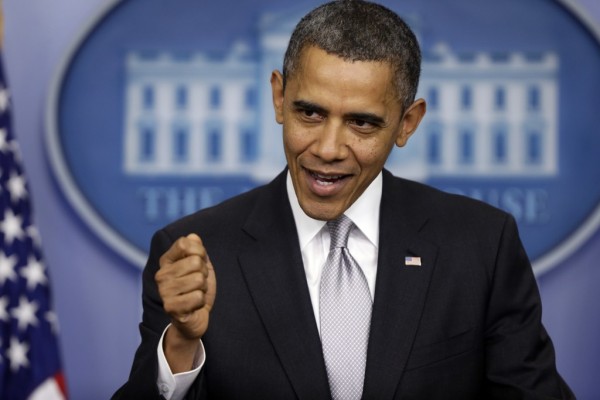 Several hundred Iranian political and human rights activists, academics, and students inside and outside Iran wrote a letter this week to US President Barack Obama asking him to engage with Iranian President Hassan Rouhani to “work towards the elimination of sanctions and the lowering of tensions between Iran and the United States.” The letter also expresses support for the 55 Iranian political prisoners who wrote a separate letter to President Obama about the impact of sanctions on Iranians.
Several hundred Iranian political and human rights activists, academics, and students inside and outside Iran wrote a letter this week to US President Barack Obama asking him to engage with Iranian President Hassan Rouhani to “work towards the elimination of sanctions and the lowering of tensions between Iran and the United States.” The letter also expresses support for the 55 Iranian political prisoners who wrote a separate letter to President Obama about the impact of sanctions on Iranians.
“Economic sanctions, particularly those imposed unilaterally by the United States, have taken a terrible toll on the Iranian people’s standard of living,” the group writes. They add, “We are concerned that the constant pressure applied by Congress to encourage a policy of confrontation will have negative repercussions on the nuclear negotiations.”
These letters join many others that have support from civil society both within and outside Iran, including from journalists, activists, and intellectuals well known for criticizing the Iranian government, urging the removal of crippling sanctions.
The full text of the letter is below.
Mr. President,
In a recent letter to you, fifty-five Iranian political prisoners enumerated their deep concerns about the negative impact of sanctions on the Iranian people. They urged you to take advantage of the opportunity presented by the election of President Hassan Rouhani to resolve the outstanding problems between the United States and Iran.
We, a group of Iranian political and human rights activists, academics, and students, are writing this letter to declare our support for the points raised by these political prisoners and to call on all parties involved to work towards the elimination of sanctions and the lowering of tensions between Iran and the United States. As the recent elections demonstrated, these are also the primary concerns of the majority of the citizens of Iran.
The fifty-five political prisoners are a diverse group who represent a large segment of Iran’s democratic movement. In the letter they have articulated the demands of the majority of Iranians when they stated that “the sanctions have now turned into a collective punishment imposed on the Iranian people as a whole, not the government only.” The Iranian people believe the sanctions are unjustified and are in large part responsible for their economic suffering. They see themselves as victims of the tensions between Washington and Tehran.
Economic sanctions, particularly those imposed unilaterally by the United States, have taken a terrible toll on the Iranian people’s standard of living. The precipitous drop in oil revenues, the destruction of a large swath of Iranian industry, rampant inflation, and widespread unemployment, while partly a result of economic mismanagement by the Iranian government, have been significantly worsened by the sanctions. Shortage of medicine in particular is a critical problem. Although medicine is not specifically restricted by sanctions, the price of medicine has increased astronomically and many life-saving drugs are extremely hard to obtain because international banks refuse to engage in financial transactions with Iran.
While the sanctions are ostensibly aimed at changing Iran’s policies regarding its nuclear program, increasingly stringent sanctions are not congruent with this aim. Iran’s nuclear program has not been affected during the past eight years; it is only the people’s standard of living that has dramatically fallen. As a result, there is a growing belief among the Iranian people is that the designers of the sanction regime are not concerned with their human rights and have instead targeted them in order to force the Islamic Republic to submit to their demands.
The failed economic blockade of Iraq in the 1990s resulted in the tragic deaths of a million innocent Iraqis, the degradation of Iraqi society, the growth of fundamentalism, and the strengthening of Saddam Hussein’s regime. We believe that the only viable path toward democracy in our country is through domestic efforts and can only be achieved by members of Iran’s civil society who persist in the struggle for change. Indeed, it was the resistance and perseverance of the democracy-seeking forces and their leaders inside Iran who were able to marginalize the extremists and achieve a victory for moderate political voices in the recent election.
We are deeply concerned about the recurrence of the Iraqi experience for Iran, which would eliminate the only opportunity for peaceful and democratic change in our country. We are certain that economic sanctions will continue to weaken Iran’s civil society and strengthen the hands of extremists.
During the recent presidential election in Iran Hassan Rouhani secured the vote of the majority of the electorate by promising to change the former government’s policies and by pledging to develop a rational foreign policy in the national interest. In Iran, President Rouhani is known for his conciliatory tendencies toward the international community. His election is an explicit statement of the widespread desire of the Iranian people to restore constructive and friendly relations with the world. The serious determination of the new president and the earnest desire of the Iranian people to take practical steps to reduce tensions have provided a rare and unique opportunity for the resolution of the nuclear dispute. If the US and other Western governments seize this opportunity, the disputes could be settled.
Four days before the inauguration of President Rouhani, the US House of Representatives passed a new set of crippling sanctions against our people. Despite the conciliatory message sent by the Iranian people with this election, the message from Congress was a hostile one, and communicated that there are forces in the US who are not interested in resolving disputes.
During the presidency of Mohammad Khatami, Iran’s reformist government voluntarily suspended its enrichment activities in 2001. The Bush administration not only did not show any interest in arriving at a resolution, but responded by labeling Iran as a member of the Axis of Evil. We believe that the subsequent change in the approach of the Islamic Republic, and its distrust of Western powers, was partly the result of the failure of the reformist government to reach an agreement with Western countries.
We are concerned that the constant pressure applied by Congress to encourage a policy of confrontation will have negative repercussions on the nuclear negotiations. Failure in the upcoming negotiations will lead to the strengthening of extremist voices on both sides. We urge you to prevent the recurrence of past mistakes and missed opportunities and take steps to open a new path towards the resolution of disputes through diplomacy.
We hope that the new Iranian government will adopt rational policies that serve the national interests of Iran and take the necessary steps towards reaching a nuclear agreement with the West. Iranian civil and political activists support actions by the Rouhani government to normalize relations with the international community. We strongly urge his administration to pursue this path.
During the recent elections, the Iranian people sent a clear message to their leaders, and to countries engaged in negotiations with Iran, that they want a reduction in tensions. Under enormously difficult economic and political circumstances, they elected a president who promised change. We hope that you and the leaders of other countries that support sanctions will hear this message and will respond in kind.
Under the current circumstances, arriving at a resolution that guarantees the complete transparency of Iran’s nuclear activities and removes the economic sanctions against Iran is within reach. For the past thirty-four years, the lack of diplomatic and official relations between the US and Iran has prevented our two countries from coming to agreements on various disputes. The first step toward improving this relationship is building mutual trust. The removal of crippling sanctions would be the clearest way for the United States to begin building this trust.
Signed:
1. Abbas Bidar (Political Activist)
2. Abbas Zargar (Lawyer)
3. Abdolali Bazargan (Researcher and Political Activist)
4. Abdolsalam Salimi (Social Activist)
5. Abolfazl Jafarpour (Political Activist)
6. Abolfazl Rahiminejad (Political Activist)
7. Abtin Ghaffari (Artist)
8. Ahad Fazel (Social Activist)
9. Ahmad Ghadyani (Students Rights Activist)
10. Ahmad Jalali Farahani (Journalist)
11. Ahmad Naghib Zade (Professor, Tehran Universiity)
12. Ahmad Nouri (Political Activist)
13. Ahmad Sadri (Professor of Sociology and Anthropology, Lake Forest College)
14. Ahmad Shakeri (Political Activist, United Republicans of Iran)
15. Ahmad Tavakoli (PhD Student in Electronics)
16. Akbar Doustar (Political Activist, United Republicans of Iran)
17. Aki Akrami (Political Activist)
18. Akram Kheyrkhah (Social Activist)
19. Alborz Zamani (Political Activist)
20. Alex Shams (Political Activist)
21. Ali Abdi (Students Rights Activist, PhD Student in Anthropology)
22. Ali Abiri (Student)
23. Ali Ajami (Political Activist)
24. Ali Akbar Mousavi Khoeini (Researcher and Political Activist)
25. Ali Amiri (Political Activist)
26. Ali Honari (Political Activist)
27. Ali Hosein Ghazizadeh (Students Rights Activist)
28. Ali Kamare’ee (Cultural Activist)
29. Ali Mirsepasi (Professor of Middle Eastern Studies and Sociology, New York University)
30. Ali Moini (Political Activist)
31. Ali naghi Mashayekhi (Professor of Management, Sharif University)
32. Ali Nikoee (Human Rights Activist)
33. Ali Nosrati (Student)
34. Ali Porsan (Human Rights Activist)
35. Ali Rezai (Political Scientist)
36. Ali Samie Zadeh (Political Activist)
37. Ali Sardari (Political Activist)
38. Ali Shakeri (Political Activist)
39. Ali Tabatabaei (Political Activist)
40. Ali Taghipoor (Students Rights Activist)
41. Ali Tarokh (Political Activist)
42. Ali Vefghi (Political Activist)
43. Alirez Firoozi (Students Rights Activist)
44. Alireza Abou Fazeli (Political Activist)
45. Alireza Gholam Hosseini (Students Rights Activist)
46. Alireza Kafaei (Political Activist)
47. Alireza Roshan (Social Activist)
48. Amin Bozorgian (Author)
49. Amir Amirgholi (Political Activist)
50. Amir Ariya Zand (Social Activist)
51. Amir Etedali (Political Activist)
52. Amir Khaleghi (Women’s Rights Activist)
53. Amir Rahi (Political Expert)
54. Amir Rashidi (Political Activist)
55. Amir Rezaei (Political Activist)
56. Amir Seraji (Social Activist)
57. Ana Adib Kia (Social Activist)
58. Arang Keshavarzian (Associate Professor of Middle Eastern and Islamic Studies, New York University)
59. Arash Azarmi (Social Activist)
60. Arash Hosseini Pajouh (Journalist)
61. Arash Khan Del (Political Activist)
62. Arash Raeisi (Political Activist)
63. Arash Raeisi Nezhad (PhD Student in Political Science)
64. Ardavan As-habi (Political Activist)
65. Arefeh Tavanfar (Political Activist)
66. Arjang Alipour (Students Rights Activist)
67. Armaghan Abiri (PhD Student in International Law)
68. Asal Abbasian (Journalist)
69. Asal Hazrati (Student)
70. Asef Bayat (Professor of Global and Transnational Studies)
71. Ashkan Iman Khan (PhD Student in Management)
72. Ashkan Jeihuri (Translator)
73. Ashkan Mojallali (Political Activist)
74. Ashkan Razavi (Political expert, Iran National Front)
75. Asie Amini (Journalist)
76. Asie Bakeri (Social Activist)
77. Ata Tehranchi (Political Activist)
78. Ayda Abroufarakh (Women’s Rights Activist)
79. Aylin Asadi Nejad (Students Rights Activist)
80. Ayub Jafari (Social Activist)
81. Azade Asadi (Social Activist)
82. Azade Khosroshahi (Social Activist)
83. Azade Kian (Director, Centre for Education, Research and Documentation for Feminist Studies, University Paris-Diderot)
84. Azade Tabatabaei (Social Activist)
85. Azam Alsadat Fatemi (Social Activist)
86. Azar Bahari (Political Activist)
87. Azita Eskandariun (Political Activist)
88. Aziz Karamlou (Republican Political Activist)
89. Babak Ahmadi (Author and Translator)
90. Babak Darbeygi (Political Activist)
91. Babak Zamanian (Political Activist)
92. Bagher Ahmadi (Human Rights Activist)
93. Bahar Karimi-karbalaei (Social Activist)
94. Bahare Saadat (Political Activist)
95. Bahman Alizade (Republican Political Activist)
96. Bahman Malek (Republican Political Activist)
97. Bahram Abbasi (Social Activist)
98. Bahram Esmaeilbeygi (Political Activist)
99. Banafshe Madani Nezhad (Faculty, Southwestern University)
100. Behdad Bordbar (Researcher)
101. Behnam Nikzad (Students Rights Activist)
102. Behrouz Fathali (Political Activist)
103. Behrouz Kazemi (Journalist)
104. Behrouz Shahrokh Nia (Political Activist)
105. Behrouz Zakeri (Student)
106. Behzad Bagheri (Political Activist)
107. Belal Mordaveysi (Students Rights Activist)
108. Bijan Khajepour Khoee (Economic Analyst)
109. Bijan Safsari (Journalist)
110. Bita Mostofi (Lawyer)
111. Camelia Haj Ghasem (Artist)
112. Daryoush Mohammad Poor (Political Scientist)
113. Daryoush Vosoughi (Republican Political Activist)
114. Davoud Dashtbani (Political Activist)
115. Davoud Moradi Gravand (Researcher)
116. Davoud Roshani (Political Activist)
117. Donya Akbari (Social Activist)
118. Dorsa Sobhani (Students Rights Activist)
119. Ebrahim Mehtari (Human Rights Activist)
120. Ebrahim Nabavi (Author and Satirist)
121. Ebrahim Safari (Political Activist)
122. Edris Salehi Golsefidi (Students Rights Activist)
123. Ehsan Amini (Student)
124. Ehsan Ebrahimi Mohtasham (Political Activist)
125. Ehsan Jalilian (Social Activist)
126. Ehsan Mansouri (Political Activist)
127. Ehsan Mojtahedi (Social Activ

